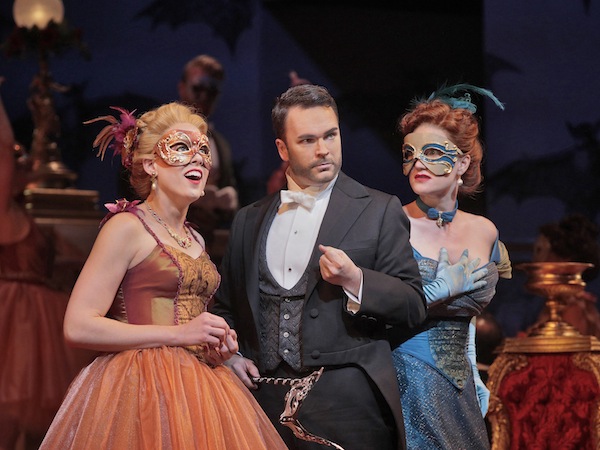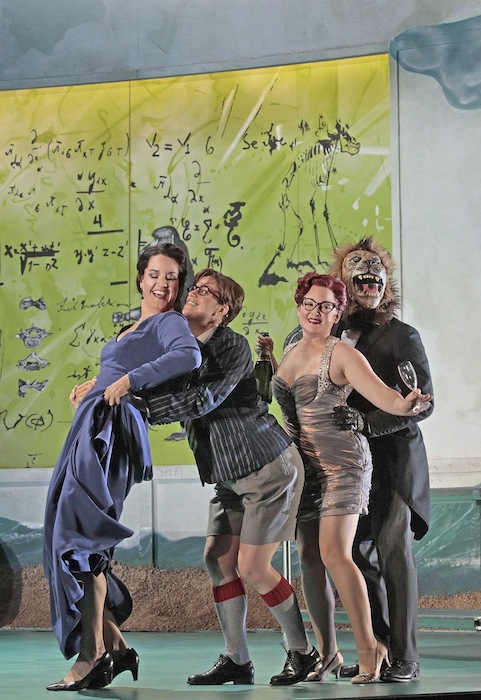A lively “Fledermaus” and confusing “Alcina” at Santa Fe Opera

Adelaide Boedecker, Joshua Hopkins and Jane Archibald in Johann Strauss Jr’s “Die Fledermaus” at Santa Fe Opera. Photo: Ken Howard
Operetta is as populist as it gets at Santa Fe Opera, the premiere destination for summer opera-goers in the United States, while other major opera companies are turning to musicals.
No operetta has been produced here more than Die Fledermaus, composed in 1874 by Johann Strauss II and returning this summer for the first time since 1992. The list of those who have defended this lightweight comedy against the champions of high art goes back at least to Gustav Mahler, who was the first to conduct it at the Hamburg Opera and then argued for Die Fledermaus as conductor of the Vienna State Opera. Like champagne swilled with abandon, this production goes down easy with lots of bubbles, but it may leave you promising never to do that again the morning after.
Conductor Nicholas Carter, principal conductor of the Adelaide Symphony Orchestra, was largely responsible for the evening’s musical success. In his American opera debut, Carter navigated the daunting twists and turns of this complex score, with just the right exaggerations of tempo and rubato. The orchestra played with confidence and style with all the necessary sparkle in the trumpets, piccolos, and percussion.
Canadian soprano Jane Archibald made an illustrious Santa Fe debut as Adele, a sassy maid with razor-sharp comic timing. Her intonation and agility were top notch in the pyrotechnics of the Laughing Song in Act II and the Act III couplet “Spiel’ ich die Unschuld vom Lande.” As Rosalinde, Devon Guthrie was at her best in the Act II Csárdás, and Paula Murrihy, standing in Tuesday night for Susan Graham, stood out for her outrageous Russian accent as the cross-dressed Prince Orlovsky.
New Mexico native Kurt Streit was not an imposing vocal presence but played up the charm of Eisenstein, a gullible foil to the strong baritone of Joshua Hopkins as Dr. Falke. David Govertsen had a chummy turn as the prison warden, Frank.
Carter’s musical leadership put some less-than-brilliant casting in the best possible light, with most of the assets of the singers more comic than musical. In particular, Kevin Burdette went way over the top, playing the drunken jailer role of Frosch in a spastic way reminiscent of Michael Keaton’s Beetlejuice. Tenor Dimitri Pittas brought down the house by adding an impromptu political reference in Act III, one of many snippets in Italian, consisting of the single word, “Scaramucci?”
Director Ned Canty, who went all out on a zany production of Menotti’s The Last Savage at Santa Fe in 2011, kept the action light and frothy. He was joined again by choreographer Seán Curran, whose numbers featuring four dancers in the second act were another highlight. The title is the only German retained in this English-language adaptation by Charles Ludlam, founder of New York’s Ridiculous Theatre Company.

Elza van den Heever, Jacquelyn Stucker and Anna Christy in “Handel’s “Alcina” at Santa Fe Opera. Photo: Ken Howard
A welcome trend at Santa Fe Opera has been the return of Baroque opera, a century and a half of the genre’s history too often ignored by modern opera companies. Not so welcome has been the tendency to present these early works in confusing, postmodern productions at Santa Fe. The best stagings of Baroque opera, like Opera Atelier’s Armide seen at Glimmerglass in 2012, take the libretto, fantasy and all, at face value.
The music in this year’s production of Handel’s Alcina was consummately refined and exquisite. Most of the vocal music was retained, but the gorgeous ballet music, composed for dancer Marie Sallé and her troupe at Covent Garden, was cut.
Elza van den Heever was dignified and forbidding in the title role of the sorceress whose magical island is destroyed. The statuesque South African soprano seduced with the beauty of her voice, especially in impeccably tuned and agile melismas.
Paula Murrihy made a mixed vocal impression as Prince Orlovsky in Die Fledermaus, but on Wednesday night the Irish mezzo-soprano was a sensation as Ruggiero. As the warrior who is magically besotted with Alcina, she produced a crisply articulated but flowing sound in runs as well as a seamless, satiny legato. The latter made her rendition of the aria “Verdi prati” a moment of almost spiritual repose.
As Bradamante, Daniela Mack, who will reprise this role with Washington National Opera next season, was more compressed in tone, an over-active vibrato clouding the vocal color. Anna Christy made a flighty and naughty Morgana, Alcina’s sister, clearly enjoying the odd characterization of the role but with a warbly quality that did not serve her big showpiece arias like “Tornami a vagheggiar” well. Soprano Jacquelyn Stucker made a noteworthy debut in the boy role of Oberto, especially in the embellishments she added to the da capo of her final aria, “Barbara! io ben lo so.”
Tenor Alek Shrader had a timid, uneven vocal presence as Oronte, Alcina’s general, happily enduring the sexual humiliation of Christy’s dominatrix Morgana. Christian Van Horn was authoritative in the few arias given to Melisso, Ruggiero’s tutor.
Harry Bicket, chief conductor of Santa Fe Opera, led a lithe performance by the streamlined orchestra, playing on modern instruments but with an ear toward historical performance practice. The addition of a concert harp, in the manner of a theorbist or chitarrone player, to the continuo group led stylishly by harpsichordist Stephen Hargreaves added magical variety in the pit. The horn playing in the third act was accomplished, and obbligato solos from a violinist and cellist placed on stage, were a highlight.
The staging by director David Alden was just as befuddling as his bizarre production of the same composer’s Radamisto in 2008. Supposedly inspired by Woody Allen’s film The Purple Rose of Cairo, Alcina’s island became an abandoned theater, with Morgana costumed initially as an usher. A luxurious theater loge stood on one side of the stage, and a wall of doors, like those leading into private boxes, rolled on and off, while some of the arias devolved into variety acts, including striptease (Morgana with ostrich feather fans), floor shows, and tap dance.
Acrobats from the Wise Fool New Mexico troupe added a surreal touch, doing handstands and mock fights throughout the evening, as both the demon-servants of Alcina and the former lovers she has turned into animals and monsters. The disconcerting overall effect was like watching a trippy David Lynch movie, in which the characters, for some unexplained reason, are singing a Handel opera.
Die Fledermaus runs through August 26, and Alcina through August 23. santafeopera.org